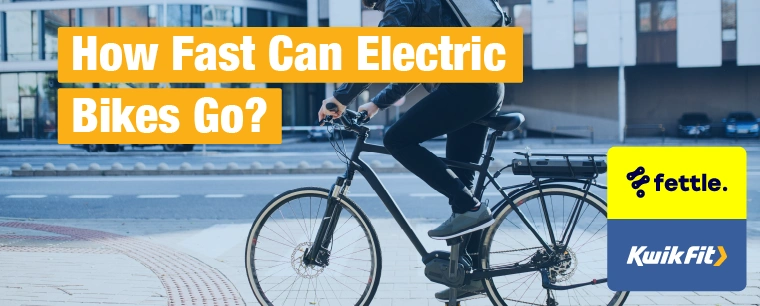How Fast Can Electric Bikes Go?
Jack Dreyer | Friday 17th November 2023 8:00am

With the world going all electric, and the average cost of electric cars staying well above £30k, many bright sparks are wondering just how fast electric bikes can go. The answer here depends on what exactly the question is – do we mean electric motorbikes or electric bicycles?
Let’s look at both.
Electric motorbikes (& motor scooters)
With the cost of electric cars being so high, it makes sense to consider the feasibility of an electric motorbike because they’re often considerably cheaper than a new car.
The problem, however, is that all-electric motorbikes are comparatively new to the transport world. The principal challenge for electric cars is to keep weight low and, unfortunately, electric batteries and motors tend to be very heavy.
This means that a snazzy all-electric road bike like this one can reach top speeds of 75 mph (which is rare at the moment) but has quite a limited range and not at a particularly low cost. It’s great if you’re planning to only use it for short-trip driving, but isn’t yet a super practical long-distance transport solution in the same way that, say, a Tesla might be.
E-bikes
Electric bicycles (or e-bikes) are a whole different kettle of fish. They clearly aren’t an alternative to electric cars for most people – but they’re also not intended to replace larger vehicle transport for most people.
E-bikes, in order to class as an ‘Electrically Assisted Pedal Cycle’ rather than a motorcycle, are essentially bicycles with electrically-powered assistance motors.
You pedal the bike as you’d pedal any bicycle, and the motor helps you to go faster, go uphill, or not have to pedal as hard. This is super helpful for anyone riding for long journeys, but is especially helpful, for example, for older folks looking for an affordable mode of active transport but who are unable to cycle fully.
E-bikes, being legally classified as pedal cycles (this also includes motor-assisted tricycles) are subject to all the benefits of normal bicycles: you can ride them on cycle paths, you don’t have to tax them, there’s no legal obligation to insure them (though many do for safety), and you can park and chain them to any bike rails.
How fast can they (legally) go?

The question then, is how fast they can go.
In theory, you could pedal to get going before the electric motor gets you up to car speed. This, unfortunately, is where the law comes in. In order to keep them as a safe mode of transport, the motor has to cut out above speeds of 15 mph – at which point the only power is the pedalling.
This essentially stops e-bikes being used as motorised scooters and makes them much safer to ride (and exempts them from all the other motor vehicle rules). After all, you’re highly exposed when riding a bicycle, falling at speed – like many motorcycle drivers know – can be extremely dangerous.
As for how fast they can go, that depends on the situation. In theory, they can go at least as fast as a normal road bike if you can pedal them as fast as a normal road bike. But the extra weight of the battery and motor make them a little harder to pedal unassisted at speed.
This extra weight also means they could reach speeds in excess of 40 mph going down hills, but the extra weight also means they’ll brake less responsively than a high end racing bicycle would.
As such, you still have to use caution and common sense when riding an e-bike. So they’re not going to be breaking any land speed records, but they’re also not going to be breaking any bones.
For the most part, you’ll be cycling them much the same as you’d cycle a normal bicycle around town – just with the added benefit of not having to get out of breath as much!
Need your e-bike serviced?
We’ve teamed up with bike servicing experts, Fettle, to offer great, affordable bicycle & e-bike services right in our centres. Find your nearest Fettle station and get in touch to book a service, repair, or inspection.
Any facts, figures and prices shown in our blog articles are correct at time of publication.
Featured Articles
Is it Illegal to Drive With One Headlight?
Saturday 19th July 2025
Wondering if it’s illegal to drive with one headlight? Learn about the safety risks and penalties of illegal blown bulbs and why you should fix them promptly.
Air Con in EVs & Hybrids: Experts Answer Your Questions
Monday 30th June 2025
Does air con drain EV batteries? Can you use the air con while charging an electric car? Find out the answers to these questions & more from Kwik Fit’s experts.
Why Is Your Car Making a Noise? Fixes & Tips
Friday 13th June 2025
When your car starts making unexpected noises, it can certainly be quite disconcerting; it may be nothing to worry about, but here’s what you need to know.









